How to jump into nothingness
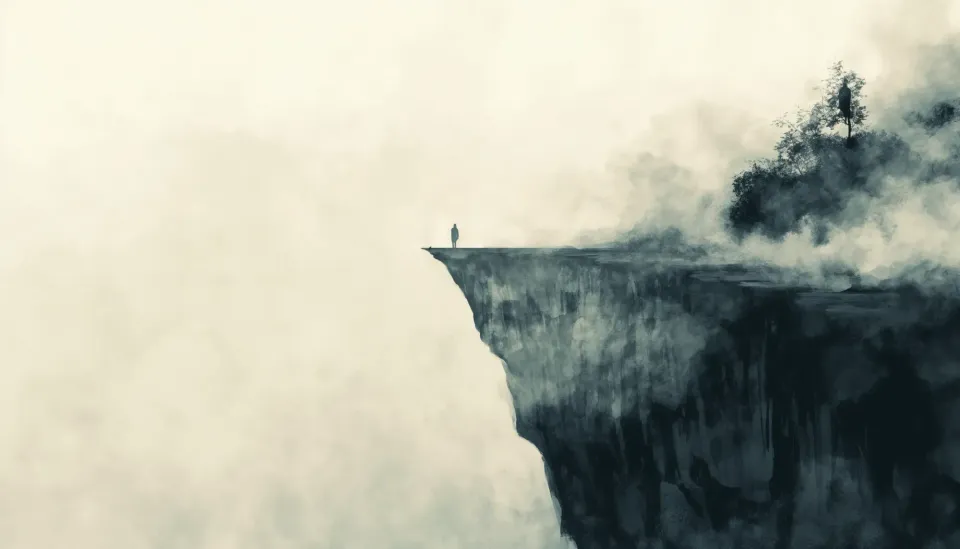
There is an ancient Zen story of a philosopher who went through mountains to find the end of the world.
Like many philosophers, he wasn’t happy here.
Philosophers are never happy here.
Now is never their time, and here is not their space.
They live there.
They live somewhere else.
This philosopher left his family, children, wife, and parents — and went on this crazy, mad search to find the end of the world.
He passed many mountains and many seas.
It was a long journey, and many times he mistakenly thought he had arrived at the destination.
On numerous occasions during the journey, fatigue and exhaustion kept deceiving him by creating the false impression that he had arrived at his destination.
But, after a great night of rest, he would regain his energy and begin to revel in the same thoughts that compelled him to start the journey.
He’d think, “The end has not come yet, and I am still in the middle because I could see further ahead and the horizon is as far away as it was before.”
So he would commence his journey again.
Again and again, he’d think he had arrived, then quickly realize that he had deceived himself once again.
Once he became aware of the deception, or more accurately, the self-deception — the journey became more arduous.
When he felt like he had arrived again, deep down, he realized that it was likely another (self) deception.
Nevertheless, he was persistent and continued his journey.
On his way, he passed many temples and many teachers — people who had arrived, or people who thought they had arrived.
These people all claimed that this was the end of the world and asked him, “Where are you going?”
The philosopher would believe their claims and would stay with them for a while, but eventually, he’d become disillusioned.
In truth, these teachers had not come to the end of the world themselves.
The temples they inhabited were mere symbols of the tiredness and the limitations of the human mind, reason, and feelings.
The end was not here, and he had to start his pilgrimage again.
Then, after many lives – after millions and millions of lives, he finally arrived at a place that looked like the end.
And this time he was not tired, and this time he was not exhausted either, and this time he was not in any way deceiving himself.
Moreover, there was no sight of temples or teachers either.
He was all alone, by himself – and the horizon had also disappeared.
There was no further goal.
Even if he had wanted to continue the journey, there was nowhere to go.
He encountered infinite emptiness.
He noticed a sign saying THIS IS THE END OF THE WORLD.
Someone who had been there before must have put it there out of compassion for those who might dare to come.
The philosopher was standing on the very edge of the world — a great cliff beyond which there was nothing but chaos, nothing but nothingness, a tremendous emptiness, a zero.
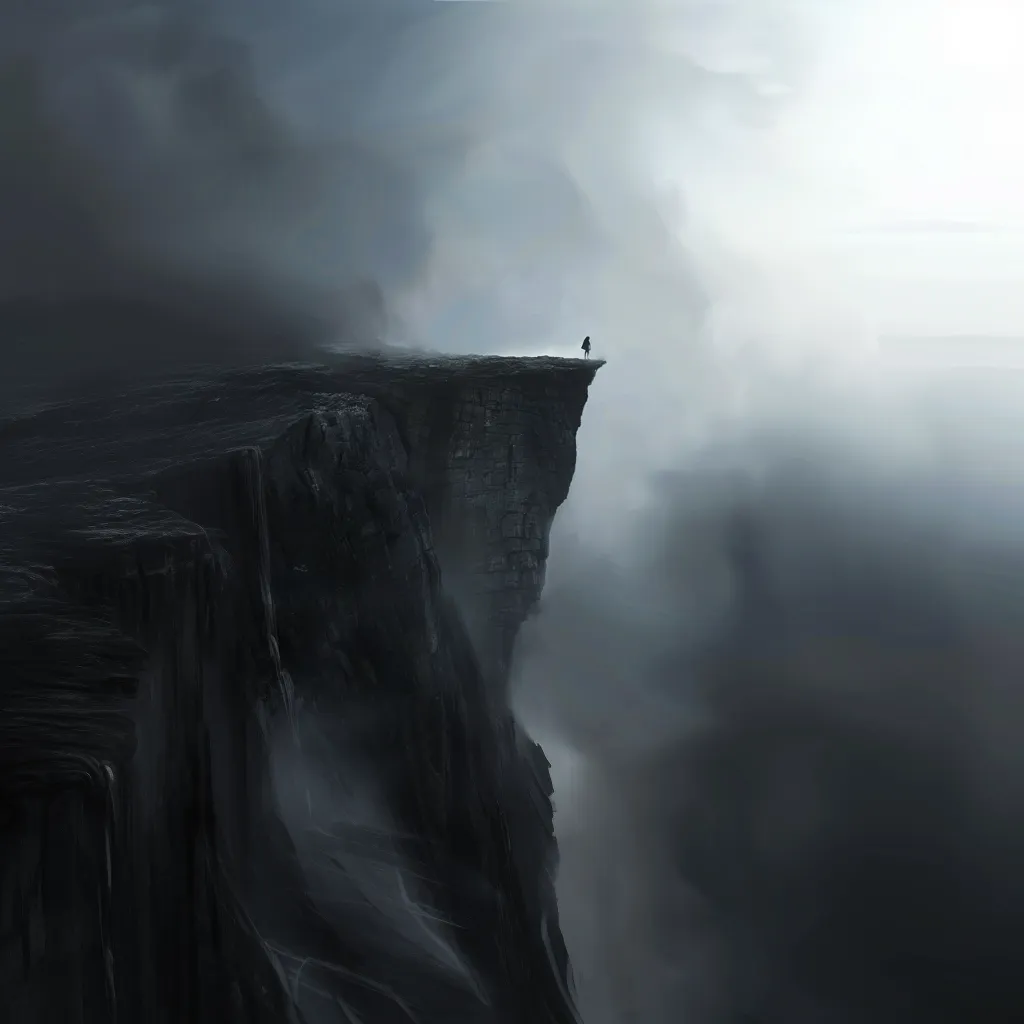
He became very frightened.
He did not anticipate finding chaos at the very end of the world.
It was unexpected.
There was no God, there was no Buddha, there was no nirvana, and there was no paradise – just utter chaos and emptiness.
He stood there on the last cliff, trembling like a leaf shaking in a strong wind.
He could not take another step and became so frightened that he escaped back to the world and into the world.
Not only that, but he didn't even look at the other side of the sign.
The signboard had some other message on the other side.
On one side it was written: THIS IS THE END OF THE WORLD, and on the other side was written: THIS IS THE BEGINNING OF THE OTHER.
But he got so frightened that he forgot there might be a message on the other side of the board.
He escaped immediately and didn’t look back.
He came back to the world and into the world and lost himself in worldly affairs so that he no longer remembered... so that the dangerous cliff came into his dreams no more.
This Zen teaching is nothing but the teaching of how to take that one step and jump into nothingness.
That nothingness is what nirvana is.
That nothingness is what God is.
On the other side of chaos lies creativity.
It is only out of the chaos that creation happens.
For example, Art is an echo of the creative force that birthed the very galaxies.
This teaching is about how to come to the very end of your mind.
It’s about how to stand there on the cliff facing the abyss and, instead of getting frightened, how to gather the courage to take the last jump.
When you die in the mind, you are born into consciousness.
When you die in the ego, you are born as God and you become existence itself.
Have a wonderful day!
Your friend,
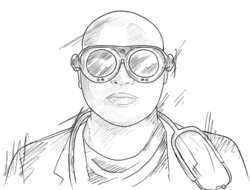
—Dr. D
🧙🏽♂️❤️🧞♂️

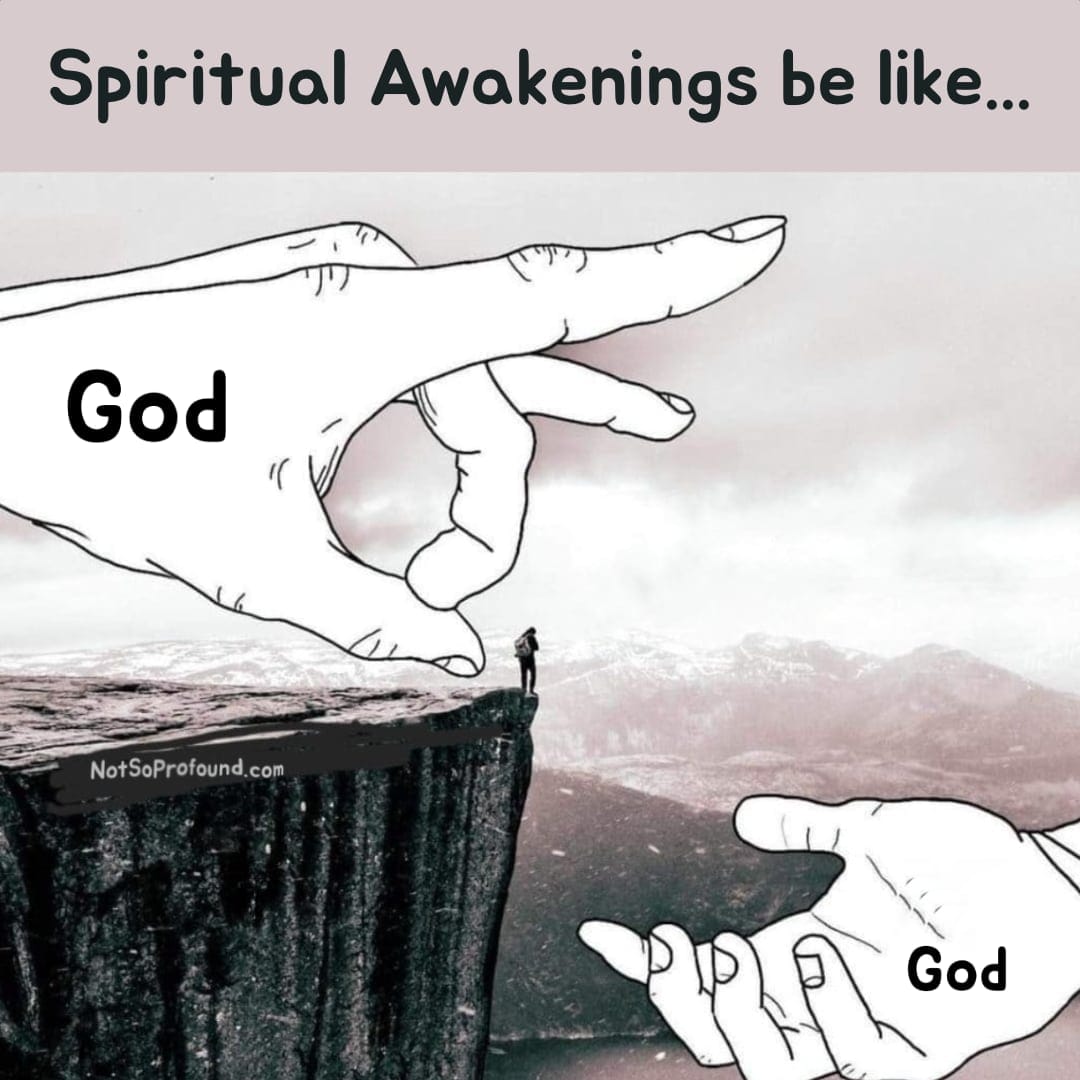

⭐ = Mustafa's favorites
📺 Documentary: Krishnas: Gurus. Karma. Murder: Interesting documentary that explores the birth of the Hare Krishna movement, sparked by an Indian Swami's message of love to disillusioned Americans. After the Swami's death, an American Guru's power struggle ensues, resulting in allegations of racketeering and murder. Be sure to also watch/listen to Joe Rogan's interview with the director David Holthouse— via IMDB ⭐
🗞️ Article: Psychoanalysis on Drugs - The article argues that psychoanalysis was never really anti-drugs, since Freud's early cocaine use influenced his work, and criticizes today's "psychedelic renaissance" led by Big Pharma for trying to make psychedelic experiences into sanitized, marketable products. Instead of this reductionist approach, the author wants a new, more open relationship between psychoanalysis and drugs. One that doesn't aim to "cure" people, but accepts the weird, indescribable aspects of subjectivity that drugs and analysis can tap into — via ParaPraxis Magazine
🗞️ Article: Can psychedelics treat people with a severe brain in jury? - The article discusses the case of Sarah, a woman who suffered severe brain damage after being hit by a car. Her husband David, desperate to revive her consciousness, experimented with the use of psilocybin, the psychoactive compound found in magic mushrooms, as a last resort — via National Geographic
📰 News + 💰 Business: MindMed Receives FDA Breakthrough Therapy Designation - MindMed received a major regulatory boost from the FDA for its investigational drug MM120 in treating generalized anxiety disorder (GAD). Remarkably, a single oral dose of MM120 demonstrated sustained and clinically meaningful reductions in anxiety symptoms for up to 12 weeks in a Phase 2b study. With these promising results, MindMed plans to advance MM120 into pivotal Phase 3 trials later this year, paving the way for a potential new treatment option for the millions of individuals suffering from the debilitating effects of GAD — via MindMed.co ⭐
🗞️ Article: Packaging the First LSD Blotter - Interesting piece on Eric Ghost's innovative 1968 packaging that disguised LSD blotter sheets as Kodak film, wrapped in protective Mylar. An included info sheet discussed set and setting's importance and anticipated modern clinical uses, but also darker behavioral modification agendas. Ghost's artifact reveals the 1960s scene understood psychedelics' complexities, even as they're newly mainstream as "medicines" today — via MIT Press ⭐
🗞️ Article: The Psychedelic Evangelist - An interesting piece on Roland Griffiths being accused of running Johns Hopkins' psychedelic trials like a "new age retreat," pushing spiritual experiences over science. The allegations reveal psychedelics' crisis of identity - are they hard science or gateways to enlightenment? Griffiths hoped his work would help humanity "awaken" to their mystical properties, even as critics blasted his methods. The comment’s section is interesting as well (non-paywall version) — via New York Times
🗞️ Article: Why is ibogaine illegal despite being a healing medicine? - Advocates push for ibogaine's legalization in the US due to its potential in treating addiction and PTSD, despite safety concerns, particularly regarding its impact on the heart. Interest in ibogaine remains high, with some seeking treatment in Mexico and companies investing in its development. A proposed research initiative in Kentucky aimed to allocate funds from opioid settlements, highlighting interest in exploring ibogaine's therapeutic potential — via The Washington Post
📺 Video: Breaking Free from Thought Identification - Addiction to thought is arguably one of the biggest underreported epidemics on planet earth— via YouTube [18:03] ⭐
🔮 I received a phone message from my dead sister - Fun Reddit thread. Doesn't matter whether you believe it or not, you're bound to be entertained, or your money back – via Reddit⭐
💰 Business: LSD, Ecstasy Lure Traders Betting on the Psychedelic Renaissance (non-paywall) - Investors are showing renewed interest in psychedelic stocks like MindMed and GH Research, with significant price surges attributed to promising developments in psychedelic therapies. The comparison to the cannabis industry's inflated value is interesting — via Bloomberg
🏛️ Policy: What psychedelics legalization and decriminalization looks like around the world - There's a lot of happening with psychedelic policy, and this should give you a great global macro perspective on what's happening around the world — via The BBC
🔊 Podcast: The Power Of Psychedelic Therapy For Members Of The Military - This episode discusses the growing interest in psychedelic-assisted therapy for treating mental health issues, especially PTSD, among veterans, including the significance of Congress's funding for clinical trials, indicating a shift towards exploring alternative treatments for veterans who haven't found relief through conventional therapies — via NPR [36:55]
🔊 Podcast: Psychedelics and Mental Health, ft. Robin Carhart-Harris - Across a series of interviews, Rose Cartwright explores so-called ‘psychedelic assisted psychotherapy’. What is it? Can it help tackle our mental health crisis? And what are the risks? Solid short episode — via The BBC [13:47]
🔊 Podcast: Natural Trip, Endogenous Psychedelics and Human Physiology - An interesting discussion on the remarkable discovery that the human body produces its own endogenous psychedelics, such as dimethyltryptamine (DMT), which play a crucial role in regulating various states of consciousness, from creativity and dreaming to near-death experiences — via The Scientist [33:14] ⭐

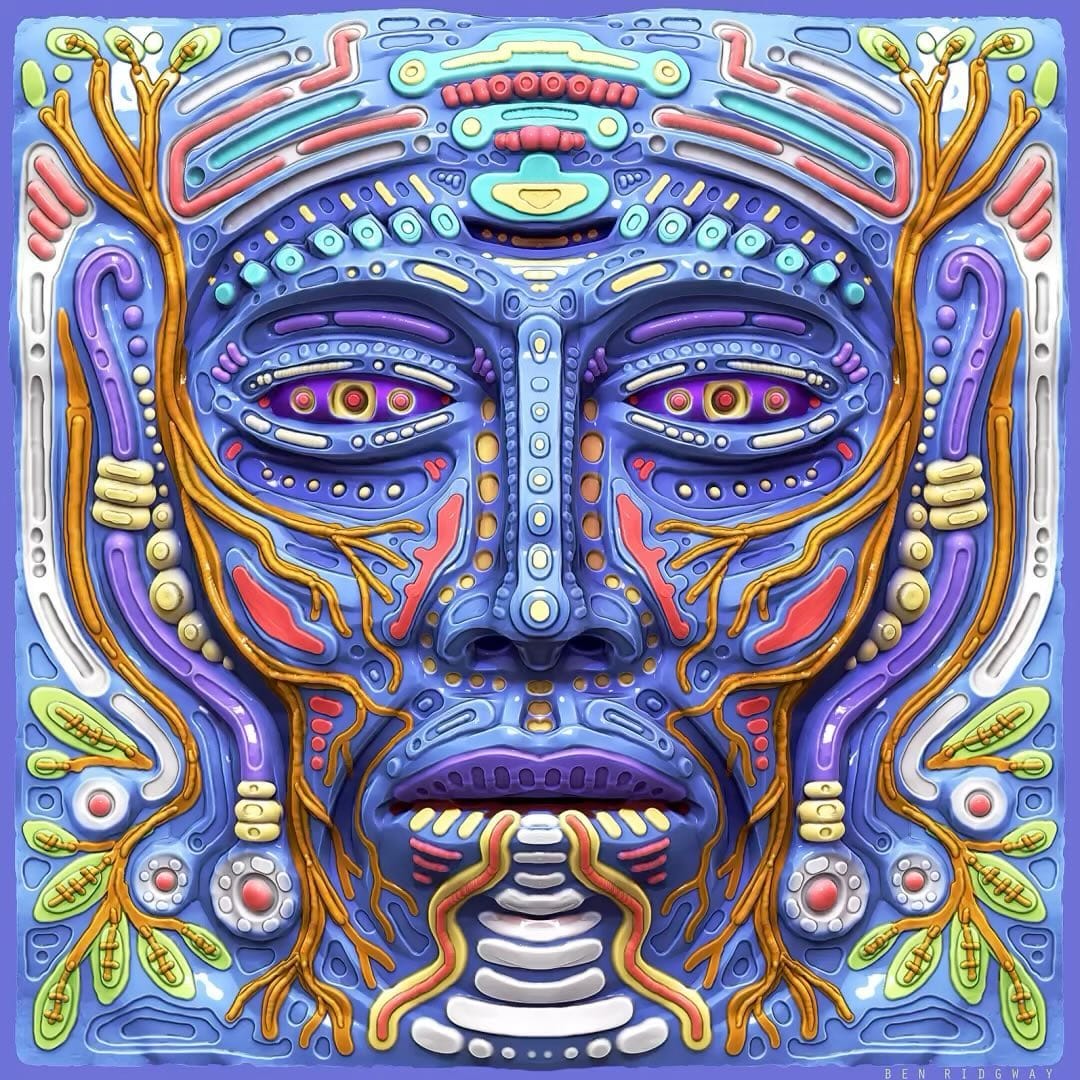

Nature loves courage.
You make the commitment, and nature will respond to that commitment by removing impossible obstacles.
Dream the impossible dream and the world will not grind you under, it will lift you up. This is the trick.
This is the shamanic dance in the waterfall.
This is how magic is done.
By hurling yourself into the abyss and discovering it’s a feather bed.
This is what all these teachers and philosophers who really counted, who really touched the alchemical gold, this is what they understood.
—Terence McKenna
Member discussion